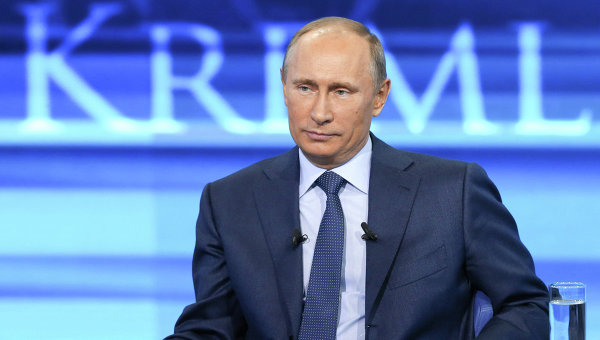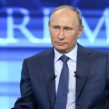
Russia’s Economic Degradation as Putin’s New Norm
Publication: Eurasia Daily Monitor Volume: 13 Issue: 6
By:

This Monday (January 11), Russia begins its traditionally delayed entry into the new year without any breaking geopolitical news but with an unusually dark economic outlook. Throughout the whole, lengthy, Russian festive season, there were no reports of airstrikes in Syria but plenty of news about the declining oil price and the corresponding weakening of the ruble. The economic recession—not in the form of a sharp spasm but in the prospect of protracted degradation—has emerged as the dominant trend that will determine Russia’s demeanor and performance in the coming months. The power-holders in the Kremlin assume that this trajectory is not leading to any catastrophic breakdown and that the population is bracing for hardships that are entirely bearable. But they are probably overestimating the patience of the masses, who have been exposed to overdoses of vicious propaganda. At the same time, the ruling elite certainly underestimate the imperative to adjust Russia’s foreign policy behavior to the reality of diminishing resources.
The macro-economic data at first glance does not look too dramatic, with a 4 percent contraction in 2015 and another 1 percent foreseen in 2016. But the World Bank identifies Russia as a major source of risk in the global financial system (Kommersant, January 7). This assessment is based on the sum total of accumulated distortions, which is indeed so tall that even mainstream Russian economists suggest an urgent need to tighten state control over the malfunctioning economy (Polit.ru, January 6). Liberal economic experts point out that the crisis is not generating solutions to the long-looming problem of the inefficiency of state corporations, and they argue that the decline of investment activity cannot be reversed without structural reforms (Moscow Echo, January 4). President Vladimir Putin, nevertheless, sees no need for action. And the newly-approved National Security Strategy, while correctly defining low competitiveness and high dependency on petro-export revenues as threats, maintains that the economy has “strengthened its potential” (Kremlin.ru, December 31, 2015).
This procrastination can partly be explained by Putin’s confusion caused by the proven falsity of his belief in the ever-increasing value of natural resources. But another part of the explanation is the still strong belief in the disruption of the world order. The Kremlin holds to the perception that the global economy is in turmoil, so Russia only needs to endure this particular episode of the evolving crisis, and then a new appreciation of commodities will bring prosperity back (Gazeta.ru, January 8). There is certainly no shortage of worrisome economic news—from the United States Federal Reserve’s decision to raise interest rates, to the Shanghai stock exchange panic attacks—but they are interpreted by the Kremlin as a proof positive of this self-serving misperception (Slon.ru, January 8). The Russian National Security Strategy, for that matter, argues that the inflow of migrants from the Middle East shows the inadequacy of the Euro-Atlantic security system built around the North Atlantic Treaty Organization (NATO) and the European Union. This expectation of the dissolution of Western institutions feeds into the desire to punish these enfeebled enemies with trade sanctions. Such an approach appears unwise given the deep contraction of the Russian market and is, in fact, quite painful for Russian consumers (Polit.ru, January 8).
The profound disconnect between the rulers obsessed with geopolitical rivalries and the vast majority of Russians living from paycheck to paycheck translates into the denial among the former of the deepening discontent among the latter. The mass protests of Russian truck drivers against new taxes has punctured that denial; consequently, Putin has had to instruct the government to reduce the tax while not giving in to the truckers’ demands as a matter of principle (Rbc.ru, January 9). State-controlled TV channels ignore this conflict, but opinion polls show that nearly 80 percent of Russians are aware of it and more that 60 percent support the drivers (Levada.ru, December 30). As always, the angst over the shrinking incomes is more visible in Moscow, but in fact the regions are being squeezed even more painfully. Indeed, the fast growth of bad debts in the regional budgets is eroding Russia’s financial stability and eliminating the possibility to wait the crisis out (Rosbalt.ru, January 8).
The distribution of regional problems is uneven, and several federal units that were relatively better off in 2015, were those with a defense-industrial profile because they received generous funding from the 2020 Armament program (Novaya Gazeta, January 3). This channeling of enormous resources toward production of strategic and conventional weapons was excessive even in the “fat” years of 2011–2012, as former finance minister Alexei Kudrin argued; and presently, it is manifestly unsustainable (Moscow Echo, January 8). The massive allocation of money to old-fashioned industrial enterprises has distorted all calculations of cost-efficiency and opened plentiful opportunities for misappropriation. And the shock from the inevitable cuts is aggravated by their ad hoc nature and inability to draft a plan for lowering the ambitious targets. The new National Security Strategy mentions the goal of avoiding a costly arms race, but the Ministry of Defense has announced its intention to stage, in 2016, twice as many test launches of strategic missiles as in 2015, when only eight launches happened (Rbc.ru, January 10). Every exercise in projecting power adds to the stress of the state budget. And by swinging public and international attention from one conflict to another, the Kremlin faces not only the costs of open-ended commitments but also fatigue that undermines the recent enthusiasm of “patriotic” mobilization (Ezhednevny Zhurnal, January 8).
Confident as he may be in the superiority of his leadership, Putin probably suspects that his performance in managing the economic crisis is not exactly stellar (Slon.ru, December 30). While speaking to broad audiences and to select groups of top oligarchs, he is strikingly unconvincing in reassurances; yet, he is clearly disinclined to listen to advice. A reshuffling of the government is always an option, but Prime Minister Dmitry Medvedev cuts a poor scapegoat. Whereas, appointing a reform-minded technocrat would mean sharing power, which Putin so obsessively gathered in his own hands. Any anti-crisis economic plan would bump up against the fiscally unsustainable but politically upheld militarization drive and also face the fierce resistance of corrupt clans of courtiers, for whom the state budget is now the only source of easy money. The petro-addicted and predatory regime has been living on borrowed economic time since the start of the decade, and it is now trying to use the fear of war in order to borrow more. But the regime’s own corruption is working against its warmongering.




